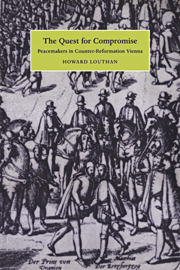Book contents
- Frontmatter
- Contents
- List of illustrations
- Acknowledgments
- A political and cultural chronology
- List of abbreviations
- Introduction
- PART I THE EMERGENCE OF AN IRENIC COURT
- PART II MAXIMILIAN II AND THE HIGH POINT OF IRENICISM
- PART III THE FAILURE OF IRENICISM
- Introduction
- 7 Confessional ambiguity and unambiguous critics: religion and the Austrian middle way
- 8 The funeral of Maximilian II: struggling for the soul of central Europe
- 9 Matthias in the Netherlands: the political failure of irenicism
- Conclusion: Storm clouds on the horizon: from the great milk war to the Thirty Years War
- Epilogue: The wider circle of irenicism
- Select bibliography
- Index
- CAMBRIDGE STUDIES IN EARLY MODERN HISTORY
7 - Confessional ambiguity and unambiguous critics: religion and the Austrian middle way
Published online by Cambridge University Press: 03 December 2009
- Frontmatter
- Contents
- List of illustrations
- Acknowledgments
- A political and cultural chronology
- List of abbreviations
- Introduction
- PART I THE EMERGENCE OF AN IRENIC COURT
- PART II MAXIMILIAN II AND THE HIGH POINT OF IRENICISM
- PART III THE FAILURE OF IRENICISM
- Introduction
- 7 Confessional ambiguity and unambiguous critics: religion and the Austrian middle way
- 8 The funeral of Maximilian II: struggling for the soul of central Europe
- 9 Matthias in the Netherlands: the political failure of irenicism
- Conclusion: Storm clouds on the horizon: from the great milk war to the Thirty Years War
- Epilogue: The wider circle of irenicism
- Select bibliography
- Index
- CAMBRIDGE STUDIES IN EARLY MODERN HISTORY
Summary
According to his own testimony Jacopo Strada was a faithful son of Rome. A week before the death of Emperor Maximilian Strada wrote to Jacopo Dani, secretary of the grand duke of Tuscany, reaffirming his allegiance to the Catholic faith. But Strada's Catholicism was not free from heterodox elements. He was in chronic trouble with the Italian Inquisition. In 1567 this ecclesiastical tribunal linked him to a group of Mantuan women accused of heresy. In 1569 Strada avoided Mantuan and Milanese territory for fear of the Inquisition. Strada was also in contact with the well-known Italian heretics Mino Celsi and Giovanni Bernardino Bonifacio. It may well have been these rumors of heresy which prompted pious Duke Albert of Bavaria to remove him from the Antiquarium project in Munich. Whatever the case may be, by 1581 he was in serious trouble with the Italian church. In that year the Inquisition passed down the order to burn him in effigy in his hometown of Mantua.
Despite these problems with the Inquisition he refused to make a clear break with Rome and in fact sought to use the church to advance the fortunes of his sons. In 1568 Paolo was elected chapter member of the Mantuan cathedral notwithstanding his father's questionable reputation. In response to Strada's years of faithful service, Archduke Rudolf recommended Ottavio in 1576 for a canonicate in Germany. It is both surprising and significant, however, that in an era preoccupied with confessional issues Strada exhibited relatively little interest in these matters. Instead he described his home as a place for all kinds of people, a forum for open discussion.
- Type
- Chapter
- Information
- The Quest for CompromisePeacemakers in Counter-Reformation Vienna, pp. 124 - 133Publisher: Cambridge University PressPrint publication year: 1997



